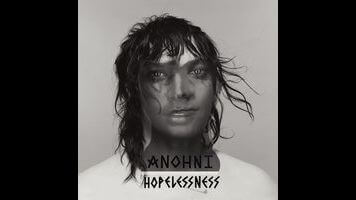No matter what she writes about, Anohni is only going to reach so many people. The transgender singer formerly known as Antony Hegarty—leader of the soul-squeezing chamber-pop group Antony And The Johnsons—wields a quavering, magically sad voice that even hardcore fans probably need a break from sometimes. Anohni knows this, and so do producers Hudson Mohawke and Oneohtrix Point Never, her collaborators on this tastefully executed electro departure.
The idea behind Hopelessness was to create a pop record packed with political lyrics: the old veggies-in-the-dessert trick. Only instead of sneaking a few pieces of finely ground broccoli into a triple-layer fudge cake, Anohni and her collaborators do cauliflower chunks covered in Splenda. Hopelessness is filled with harsh, spastic synthpop that never delivers one of those hedonistic disco beats Anohni murdered on Hercules And Love Affair’s 2008 debut, a previous dance-floor dalliance. Lyrically, it’s blunt tales of war, pollution, government spying, and other injustices perpetrated by the American patriarchy. Compared with the morose, string-laden music Anohni is known for, this is an Ariana Grande album, but it remains experimental and emotional enough to feel natural. Anohni is broadening her audience—not courting a broad audience.
Opener “Drone Bomb Me” sets the template. Anohni plays a young Afghan girl begging for death from above. “Blow my head off” and “Explode my crystal guts,” Anohni sings over grand, twinkling synths and an almost danceable beat. She’s riffing on the idea of guilt, just as she does on the soulful “Watch Me,” where she facetiously thanks the government for playing daddy. There’s a warm glow amid the glitch of “Why Did You Separate Me From The Earth?,” wherein Anohni uses one of her more commanding performances to link environmental degradation with the subjugation of women.
The poetry in that song offers a welcome contrast to “Obama” and “Crisis”—relatively tuneless and didactic songs about our outgoing president’s failed promises and how U.S. foreign policy breeds terrorism. “Now you’re cutting heads off innocent people on TV,” Anohni sings soberly on the latter, before setting cries of “I’m sorry” against incongruously optimistic synths.
While Hopelessness is the singer’s first album as Anohni, the songs make no direct reference to issues facing the transgender community—many of which she covered eloquently in her letter explaining why she boycotted the 2016 Oscars. Instead, the 44-year-old English-born, American-raised singer reps for other mistreated groups (women, children, animals, and death-row inmates) and examines her role, as a U.S. taxpayer, in their suffering.
“How did I become a virus?” she asks on the title track, indicting all of mankind over a supple Arthur Russell art-pop groove. With a voice that makes her sound perpetually stranded on a desert island, Anohni is sending an SOS to—and for—the world. Regardless of how many people hear it, at least she can say she tried.









































